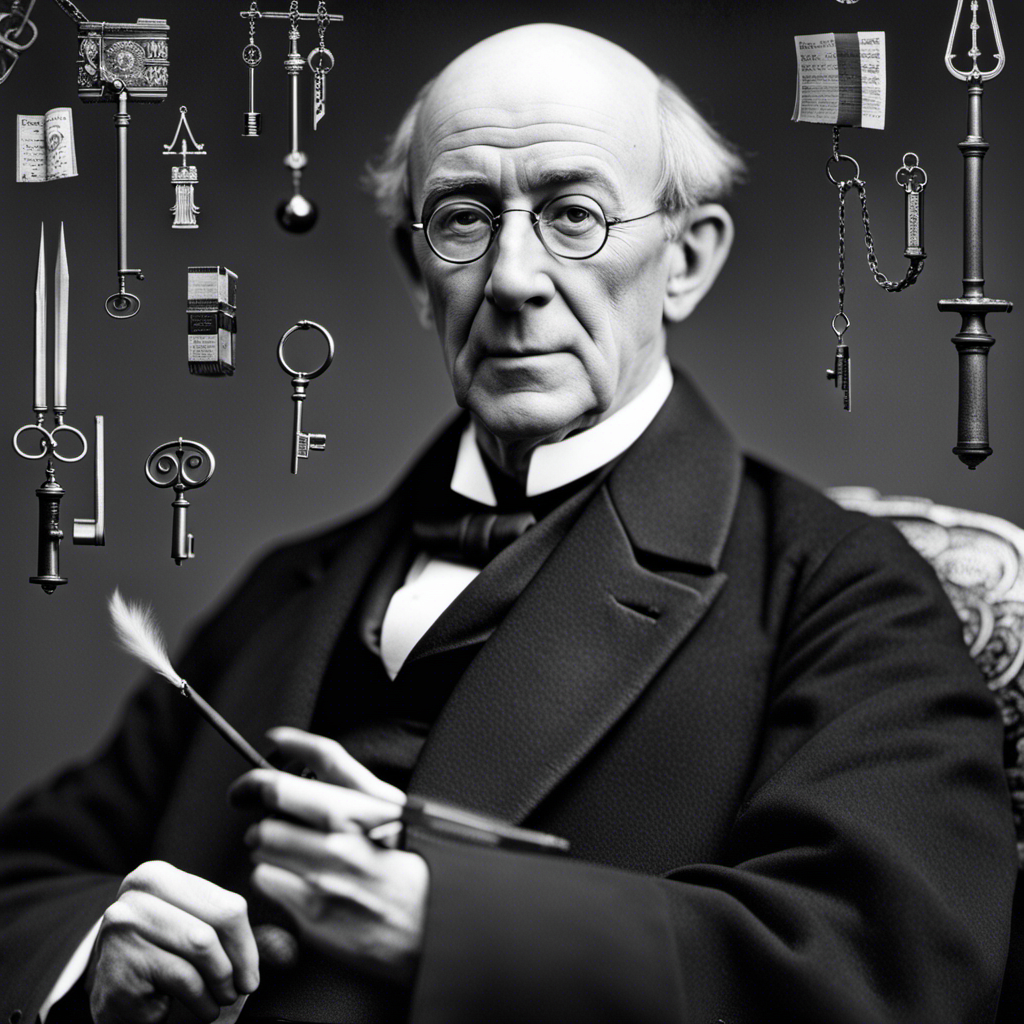Are you ready to dive into the fascinating world of William Lloyd Garrison? Get ready to uncover some intriguing fun facts about this influential figure in American history.
From his early life and education to his journey towards abolitionism, you’ll discover the remarkable path that led him to found The Liberator.
Explore how Garrison’s passionate activism and unique approach made a lasting impact on the fight against slavery.
Join us on this captivating journey as we delve into the legacy of William Lloyd Garrison.
Key Takeaways
- William Lloyd Garrison was born in 1805 in Massachusetts and faced poverty and the loss of family members during his early life.
- He developed strong convictions against slavery and used his platform as the editor of The Liberator to speak out against the horrors of slavery.
- Garrison’s fearless speech and advocacy for freedom and social change shaped the course of abolitionism and inspired countless individuals to take action against slavery.
- His work in founding The Liberator and his involvement in anti-slavery societies brought together like-minded individuals and employed powerful strategies and innovative tactics to fight against slavery and bring about social justice.
Early Life and Education
William Lloyd Garrison’s early life and education were filled with hardships, but he persevered and became a prominent abolitionist.
Born in 1805 in Massachusetts, he experienced poverty and the loss of family members at a young age. Despite these challenges, his thirst for knowledge led him to work as an apprentice for a newspaper publisher, where he honed his writing skills.
He also attended various schools and self-educated himself on topics like literature, philosophy, and theology. His education allowed him to develop strong convictions against slavery and become an influential voice in the abolitionist movement.
Through his innovative ideas and visionary approach, Garrison sought to unite people who desired belonging by advocating for the immediate emancipation of enslaved individuals. His early life experiences shaped his determination to fight for justice and equality throughout his career as an abolitionist leader.
Journey to Abolitionism
During your journey to abolitionism, you faced numerous challenges and opposition. But despite the obstacles, your early activism played a vital role in shaping the abolitionist movement.
Your innovative ideas and visionary approach captivated those who desired belonging and change. You fearlessly spoke out against the horrors of slavery, igniting a fire within others to join your cause.
Your impact on the abolitionist movement cannot be overstated. Through your influential writings and speeches, you inspired countless individuals to take action against injustice.
Your unwavering commitment to ending slavery led to the establishment of The Liberator, a newspaper that became a platform for spreading awareness and rallying support for the abolitionist cause.
Your dedication and passion continue to inspire generations of activists fighting for equality and justice today.
Founding The Liberator
When you founded The Liberator, you created a powerful platform for spreading awareness and rallying support for the abolitionist cause. Your innovative and visionary approach to journalism has had a significant impact on the abolitionist movement.
Through The Liberator, you have been able to reach a wide audience and inspire them to take action against slavery. Your words have ignited a sense of belonging among those who desire justice and equality.
The Liberator has become an essential tool in exposing the horrors of slavery and building momentum for its abolition. By fearlessly speaking out against oppression and advocating for freedom, you have paved the way for future generations to continue fighting for social change.
Your founding of The Liberator has forever shaped the course of abolitionism.
Anti-Slavery Society and Activism
Get ready to dive into the impact of William Lloyd Garrison as an abolitionist. You’ll be inspired by how Garrison’s unwavering dedication paved the way for a movement that would change history.
Discover the formation of anti-slavery societies, bringing together like-minded individuals who were determined to fight against the institution of slavery.
Explore the powerful strategies employed by activists during this time. Learn about the innovative tactics used by these passionate individuals as they worked tirelessly to bring about social justice and equality.
Garrison’s Abolitionist Impact
Garrison’s abolitionist impact was significant and far-reaching. His unwavering dedication to the cause of ending slavery had a profound effect on society, sparking a movement that would eventually lead to the emancipation of millions.
Garrison played a pivotal role in the abolitionist movement, using his platform as an editor and writer to spread his visionary ideas about equality and justice. Through his influential newspaper, The Liberator, he exposed the horrors of slavery and urged others to take action.
Garrison’s words resonated with many who desired belonging in a world free from oppression, inspiring countless individuals to join the fight against slavery. His innovative approach challenged societal norms and pushed for immediate emancipation, paving the way for future civil rights movements.
Anti-Slavery Society Formation
Now that you’ve learned about William Lloyd Garrison’s impactful role in the abolitionist movement, let’s dive into another fascinating aspect of his legacy.
One of Garrison’s most notable contributions was his involvement in the formation of anti-slavery societies. These organizations played a crucial role in uniting like-minded individuals who were determined to end the institution of slavery. Through these societies, people from all walks of life came together, sharing their passion and dedication to this noble cause.
The impact of these organizations on society cannot be overstated. They provided a platform for individuals to voice their opposition to slavery and advocate for its abolition. By mobilizing communities and spreading awareness through various means such as pamphlets and public lectures, these societies helped galvanize public opinion against slavery. Their efforts paved the way for future advancements in civil rights and social justice.
Join me as we explore more remarkable facts about William Lloyd Garrison and his incredible journey towards societal transformation!
Activism Strategies Employed
As you delve into Garrison’s involvement in the formation of anti-slavery societies, it’s fascinating to discover the various activism strategies employed by these organizations to raise public awareness and rally support against slavery. The impact of these strategies on abolitionism cannot be overstated.
Here are three innovative and influential approaches utilized by these societies:
-
Publishing newspapers filled with powerful essays, stories, and firsthand accounts that highlighted the horrors of slavery.
-
Organizing lectures and public meetings where passionate speakers shared their experiences and educated audiences about the need for immediate emancipation.
-
Conducting petition campaigns to collect signatures demanding an end to slavery, which not only demonstrated widespread opposition but also put pressure on lawmakers.
These impactful activism strategies helped ignite a national conversation about slavery, fostering a sense of belonging among those who longed for a more just society. Through their efforts, anti-slavery societies played a pivotal role in shaping public opinion and ultimately advancing the cause of abolitionism.
The Garrisonian Approach
You should know that the Garrisonian Approach was a key part of William Lloyd Garrison’s advocacy for immediate abolition of slavery. This approach, influenced by Garrison’s strong beliefs and unwavering commitment to justice, aimed to achieve its goal through nonviolent means and moral persuasion.
The Garrisonian Approach emphasized the power of language and public speaking as transformative tools in the fight against slavery. It sought to confront the nation with the harsh realities of slavery, challenging individuals to question their own complicity in this immoral institution.
Women’s Rights Advocacy
Imagine how empowering it must have felt for women involved in the women’s rights movement to advocate for their own equality and demand social and political change. They were trailblazers, challenging societal norms and fighting for a future where gender equality would be the norm. In their pursuit of justice, they spearheaded the women’s suffrage movement, tirelessly campaigning for the right to vote. Their dedication and determination paved the way for future generations of women to actively participate in shaping their communities.
- Women’s Suffrage Movement: These brave women fought relentlessly to secure voting rights for themselves and future generations.
- Gender Equality Initiatives: They championed initiatives that aimed to dismantle systemic barriers based on gender, striving towards true equality.
- Social and Political Change: Through their advocacy efforts, these remarkable individuals sparked a revolution that continues to shape our society today.
Their legacy is an inspiration, encouraging us all to stand up for what we believe in and work towards a more inclusive world where everyone has equal opportunities.
The American Anti-Slavery Society
The American Anti-Slavery Society, founded in 1833, played a crucial role in the abolitionist movement. This society was at the forefront of anti-slavery activism, tirelessly working towards the liberation of enslaved individuals and promoting equality for all.
With its innovative and visionary approach, the American Anti-Slavery Society ignited a spark that inspired countless individuals to join their cause. They believed in the power of unity and strived to create a sense of belonging among those fighting against slavery.
Their influential efforts paved the way for significant progress in dismantling this unjust institution. The American Anti-Slavery Society stood as a beacon of hope, driving forward change and leaving an indelible mark on history.
Their unwavering dedication continues to inspire generations to fight for justice and equality today.
Conflict With Other Abolitionists
However, it’s important to note that the American Anti-Slavery Society faced conflicts with other abolitionists who disagreed on various strategies and approaches. These conflicts had a significant impact on the other abolitionist movements of the time.
Here are some key points to consider:
-
Differing Approaches: The American Anti-Slavery Society clashed with other abolitionists who believed in gradual emancipation rather than immediate abolition. This led to heated debates and divisions within the movement.
-
Conflict Resolution: Despite these disagreements, efforts were made by both sides to find common ground and work towards their shared goal of ending slavery. Mediation and discussions were held in an attempt to resolve conflicts and foster unity.
-
Impact on Other Movements: The conflicts between the American Anti-Slavery Society and other abolitionist groups influenced the overall direction of the movement. It sparked conversations about effective strategies, tactics, and messaging that would ultimately shape the fight against slavery.
In navigating these conflicts, both cooperation and compromise played vital roles in advancing their cause.
Influence on Frederick Douglass
Prepare to delve into the profound influence of Garrison on the remarkable Frederick Douglass.
As you explore this captivating subtopic, you will uncover the depths of Garrison’s abolitionist teachings and their lasting impact on Douglass’ journey towards liberation.
Brace yourself for a mesmerizing discussion as you discover the unwavering admiration that Douglass held for his mentor, proving that even in the darkest times, inspiration can ignite a fiery determination to fight for freedom.
Garrison’s Abolitionist Teachings
Garrison’s abolitionist teachings greatly influenced the anti-slavery movement. His powerful and influential writings left a lasting impact on future activists, inspiring them to join the fight against slavery.
Here are three key ways in which Garrison’s teachings shaped the course of history:
-
Emphasizing moral urgency: Garrison’s writings conveyed a sense of moral responsibility and urgency, compelling others to take immediate action against the institution of slavery.
-
Promoting nonviolent resistance: Garrison advocated for nonviolent methods of resistance, such as boycotts and peaceful protests, which inspired future activists like Martin Luther King Jr. in their fight for justice.
-
Challenging societal norms: Through his writings, Garrison challenged societal norms by openly condemning slavery as a moral evil. This revolutionary perspective challenged others to question their own beliefs and ultimately contributed to the abolitionist cause.
Garrison’s visionary approach and influential words continue to inspire generations of activists who strive for equality and social justice today.
Douglass’ Admiration for Garrison
You can’t help but admire Douglass’ deep admiration for the influential teachings of Garrison.
Frederick Douglass, a prominent African-American abolitionist and social reformer, was greatly inspired by William Lloyd Garrison, one of the leading figures in the fight against slavery.
Douglass recognized that Garrison’s powerful words and unwavering dedication to the cause had a profound impact on both himself and others who desired belonging in a society free from the shackles of oppression.
Through Garrison’s influence, Douglass found his own voice and became an eloquent speaker and writer, fearlessly advocating for equal rights and justice for all.
Their collaboration in various abolitionist organizations helped to ignite a movement that would ultimately lead to the emancipation of millions of enslaved individuals.
The legacy of their partnership serves as a testament to the power of unity and shared vision in creating lasting change.
Impact of The Liberator
Don’t underestimate the impact that The Liberator had on the abolitionist movement. This influential newspaper, founded by William Lloyd Garrison in 1831, played a pivotal role in challenging the institution of slavery and rallying support for its eradication. Its visionary approach and powerful language inspired countless individuals to join the fight against slavery.
The Liberator sparked widespread debate and discussion, forcing people to confront the brutal realities of slavery. Through its bold editorials and articles, it exposed the injustices experienced by enslaved people, shaking the foundations of pro-slavery arguments. Garrison’s uncompromising stance on immediate emancipation resonated with like-minded individuals who became dedicated activists in their own right.
The Liberator was not just a newspaper; it was a catalyst for change. Its impact on slavery and the abolitionist movement cannot be overstated. It brought people together, fostering a sense of belonging among those fighting for freedom and equality.
The Liberator’s End and Final Years
The Liberator ceased publication in 1865 after playing a crucial role in the abolitionist movement. It was a beacon of hope, shedding light on the atrocities of slavery and rallying people to fight for justice. But its impact didn’t end there.
William Lloyd Garrison, the editor and founder, continued his visionary work even after The Liberator’s closure. One notable aspect of Garrison’s legacy is his impact on women’s rights advocacy. He believed fervently in equal rights for all, including women, and he openly supported their fight for suffrage and equality. His unwavering dedication inspired many women to become leaders in the feminist movement.
However, not everyone agreed with Garrison’s methods or ideas. His uncompromising stance on immediate emancipation often clashed with other abolitionists who advocated for more gradual approaches. These conflicts sometimes turned heated, but Garrison remained steadfast in his convictions.
In his final years, William Lloyd Garrison left an indelible mark on both the abolitionist and women’s rights movements. His innovative thinking challenged societal norms and helped pave the way towards a more inclusive future where everyone could find belonging and equality.
Legacy and Historical Significance
Garrison’s lasting impact on the abolitionist and women’s rights movements can still be felt today. His legacy is one of immense historical significance, as his tireless efforts in fighting for equality have paved the way for a more just society. Here are three key aspects that highlight the impact of Garrison’s work:
-
Inspiration: Garrison’s unwavering commitment to justice has inspired generations of activists and reformers, encouraging them to continue advocating for social change.
-
Advocacy: Through his newspaper, The Liberator, Garrison used his platform to raise awareness about the horrors of slavery and championed the cause for its immediate abolition.
-
Intersectionality: Garrison recognized the interconnectedness of various forms of oppression and fought not only against slavery but also advocated for women’s rights and other social justice causes.
Garrison’s vision and influence continue to resonate today, reminding us that our actions have the power to shape a better future.
Quotes and Speeches
Now that you know about William Lloyd Garrison’s legacy and historical significance, let’s delve into his powerful quotes and speeches. Prepare to be inspired!
Garrison was a master of words, using them as a weapon in the fight against slavery. His speeches were electrifying, captivating audiences with their passion and conviction.
One of his famous quotes is, ‘I am in earnest—I will not equivocate—I will not excuse—I will not retreat a single inch—and I will be heard!’ These words echo with determination and resolve, urging us all to stand up for what we believe in.
Another memorable quote from Garrison is, ‘With reasonable men, I will reason; with humane men I will plead; but to tyrants I will give no quarter.’ This statement encapsulates his unwavering commitment to justice and equality.
Through his powerful words, Garrison left an indelible mark on history and continues to inspire generations today.
Frequently Asked Questions
What Was William Lloyd Garrison’s Favorite Childhood Book?
Your favorite childhood book, an early influence, shaped your perspective and inspired you to make a difference. Embrace the power of literature and let it guide you on your journey towards creating positive change in the world.
Did William Lloyd Garrison Have Any Siblings?
Yes, William Lloyd Garrison had siblings. Now let’s talk about his favorite childhood book. It’s interesting to learn about the family dynamics and how they influenced his life and work.
What Was William Lloyd Garrison’s Favorite Quote About Women’s Rights?
William Lloyd Garrison, a prominent abolitionist, believed in the equal rights of women. One of his favorite quotes about women’s rights was “I shall be glad to see the day when women are recognized as independent and self-supporting beings.” This quote reflects his visionary views on gender equality.
How Did William Lloyd Garrison Feel About the American Anti-Slavery Society’s Tactics?
William Lloyd Garrison believed that the American Anti-Slavery Society’s tactics were too moderate and slow. He argued for immediate abolition of slavery, which some criticized as radical. However, his strong stance inspired many to join the cause.
What Were Some of the Arguments Used by Those Who Disagreed With William Lloyd Garrison’s Approach to Abolitionism?
Some people disagreed with William Lloyd Garrison’s approach to abolitionism. They argued against his tactics and believed they were not effective in achieving their goals. However, his impact on the abolitionist movement cannot be denied.
Conclusion
You’ve now come to the end of this captivating journey through the life and accomplishments of William Lloyd Garrison.
From his early years to his pivotal role in the abolitionist movement, Garrison’s unwavering dedication and passion for justice have left an indelible mark on history.
Through The Liberator, he fearlessly challenged the status quo and inspired countless others to join him in the fight against slavery.
His legacy as a visionary leader continues to inspire generations, reminding us of the power of activism and speaking truth to power.
As we reflect on his words and actions, let us be inspired to create a more just and equitable future for all.





